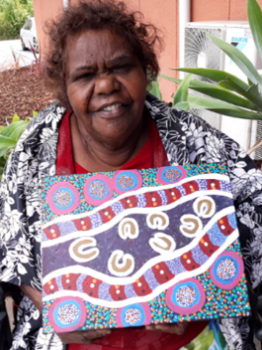Ina's story
Please note: Aboriginal and Torres Strait Islander people should be aware that this page may contain images of deceased persons.
 Ina is an Aboriginal woman and artist from Central Australia. After living with diabetes for 20 years, she was diagnosed with kidney failure and told she would need to have dialysis. The diagnosis was a surprise to her and at first, she didn’t know what dialysis was. She was nervous about the treatment and had to move to Adelaide to access it.
Ina is an Aboriginal woman and artist from Central Australia. After living with diabetes for 20 years, she was diagnosed with kidney failure and told she would need to have dialysis. The diagnosis was a surprise to her and at first, she didn’t know what dialysis was. She was nervous about the treatment and had to move to Adelaide to access it.
Leaving her country, family and community was difficult and at first Ina was homesick.
'When the sun went down, I was sitting outside and thinking about home. Up in the land at night-time, we always sat outside and watched the stars, beautiful stars. And I miss the stars.'
Although she was worried initially, Ina has friends in Adelaide now and is happy, but says her home is still up North. She travels back sometimes and has used mobile dialysis services to receive treatment while she visits home. Ina has also developed ways to manage her treatment and take care of herself. She makes sure to cook dinner to refrigerate before she goes to dialysis, so she doesn’t need to worry about preparing a meal when she gets home.
But she says the most difficult thing about living with kidney disease is how hard it is on Aboriginal people from remote regions to move far away from home to receive treatment.
'It’s very important and pretty difficult to manage. Some of us, some of our families, lose us on this machine.'
Ina enjoyed being a part of the Kidney Health Australia Yarning Kidneys Consultations. It was important to her to talk with doctors about her journey and contribute to the new guidelines for treatment and management of CKD in Aboriginal and Torres Strait Islander peoples.
To Ina, it is important to share her story so that her family and the children growing up in her community know to take care of their kidney health and to have kidney checks.
This case study is based on an interview with a person who is living with chronic kidney disease. This personal account is not necessarily representative of the circumstances of other people with chronic kidney disease or the challenges they may face, but it is our hope that it will give readers a greater awareness and understanding of the diversity of people’s experiences with CKD.
The information provided does not contain medical advice – consult a qualified healthcare professional for guidance relating to your personal medical needs.


